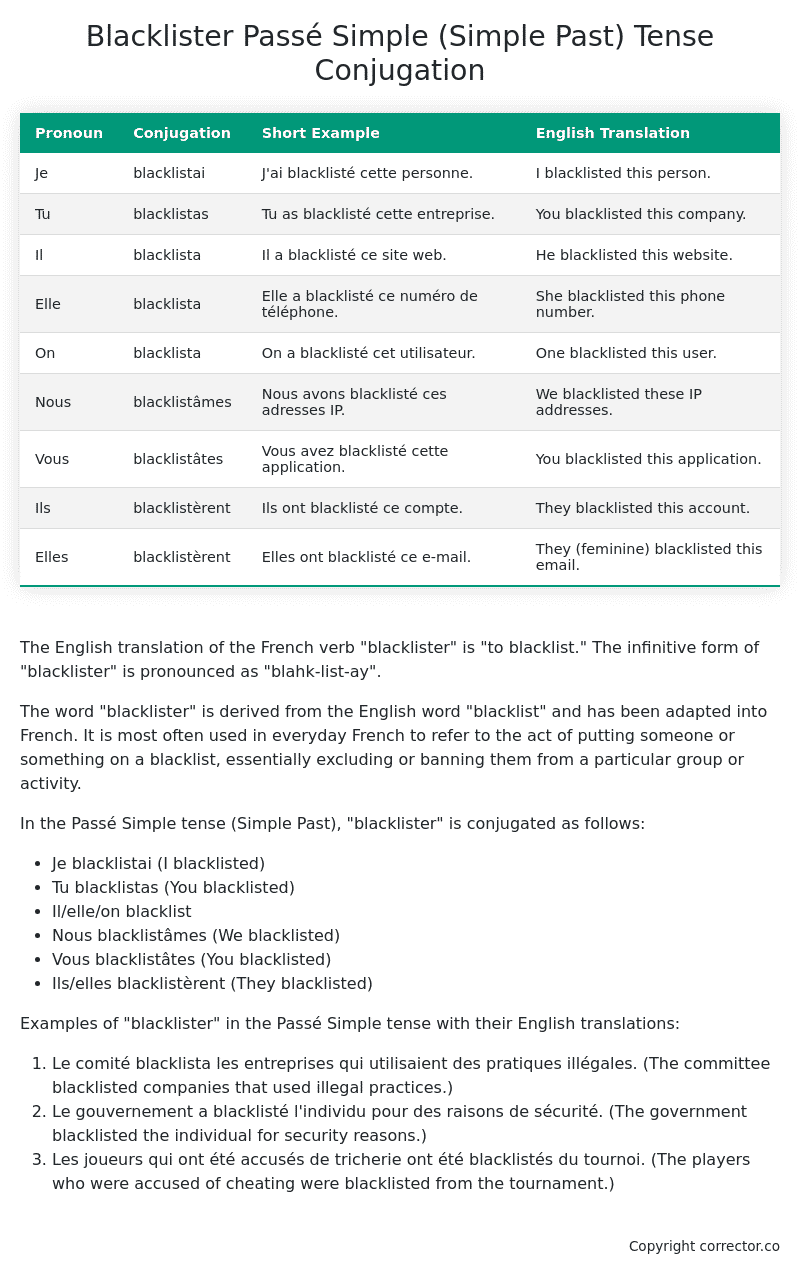Passé Simple (Simple Past) Tense Conjugation of the French Verb blacklister
Introduction to the verb blacklister
The English translation of the French verb “blacklister” is “to blacklist.” The infinitive form of “blacklister” is pronounced as “blahk-list-ay”.
The word “blacklister” is derived from the English word “blacklist” and has been adapted into French. It is most often used in everyday French to refer to the act of putting someone or something on a blacklist, essentially excluding or banning them from a particular group or activity.
In the Passé Simple tense (Simple Past), “blacklister” is conjugated as follows:
- Je blacklistai (I blacklisted)
- Tu blacklistas (You blacklisted)
- Il/elle/on blacklist
- Nous blacklistâmes (We blacklisted)
- Vous blacklistâtes (You blacklisted)
- Ils/elles blacklistèrent (They blacklisted)
Examples of “blacklister” in the Passé Simple tense with their English translations:
- Le comité blacklista les entreprises qui utilisaient des pratiques illégales. (The committee blacklisted companies that used illegal practices.)
- Le gouvernement a blacklisté l’individu pour des raisons de sécurité. (The government blacklisted the individual for security reasons.)
- Les joueurs qui ont été accusés de tricherie ont été blacklistés du tournoi. (The players who were accused of cheating were blacklisted from the tournament.)
Table of the Passé Simple (Simple Past) Tense Conjugation of blacklister
| Pronoun | Conjugation | Short Example | English Translation |
|---|---|---|---|
| Je | blacklistai | J’ai blacklisté cette personne. | I blacklisted this person. |
| Tu | blacklistas | Tu as blacklisté cette entreprise. | You blacklisted this company. |
| Il | blacklista | Il a blacklisté ce site web. | He blacklisted this website. |
| Elle | blacklista | Elle a blacklisté ce numéro de téléphone. | She blacklisted this phone number. |
| On | blacklista | On a blacklisté cet utilisateur. | One blacklisted this user. |
| Nous | blacklistâmes | Nous avons blacklisté ces adresses IP. | We blacklisted these IP addresses. |
| Vous | blacklistâtes | Vous avez blacklisté cette application. | You blacklisted this application. |
| Ils | blacklistèrent | Ils ont blacklisté ce compte. | They blacklisted this account. |
| Elles | blacklistèrent | Elles ont blacklisté ce e-mail. | They (feminine) blacklisted this email. |
Other Conjugations for Blacklister.
Le Present (Present Tense) Conjugation of the French Verb blacklister
Imparfait (Imperfect) Tense Conjugation of the French Verb blacklister
Passé Simple (Simple Past) Tense Conjugation of the French Verb blacklister (You’re reading it right now!)
Passé Composé (Present Perfect) Tense Conjugation of the French Verb blacklister
Futur Simple (Simple Future) Tense Conjugation of the French Verb blacklister
Futur Proche (Near Future) Tense Conjugation of the French Verb blacklister
Plus-que-parfait (Pluperfect) Tense Conjugation of the French Verb blacklister
Passé Antérieur (Past Anterior) Tense Conjugation of the French Verb blacklister
Futur Antérieur (Future Anterior) Tense Conjugation of the French Verb blacklister
Subjonctif Présent (Subjunctive Present) Tense Conjugation of the French Verb blacklister
Subjonctif Passé (Subjunctive Past) Tense Conjugation of the French Verb blacklister
Subjonctif Imparfait (Subjunctive Imperfect) Tense Conjugation of the French Verb blacklister
Conditionnel Présent (Conditional Present) Tense Conjugation of the French Verb blacklister
Conditionnel Passé (Conditional Past) Tense Conjugation of the French Verb blacklister
Conditionnel Passé II (Conditional Past II) Tense Conjugation of the French Verb blacklister
L’impératif Présent (Imperative Present) Tense Conjugation of the French Verb blacklister
L’impératif Passé (Imperative Past) Tense Conjugation of the French Verb blacklister
L’infinitif Présent (Infinitive Present) Tense Conjugation of the French Verb blacklister
L’infinitif Passé (Infinitive Past) Tense Conjugation of the French Verb blacklister
Le Participe Présent (Present Participle) Tense Conjugation of the French Verb blacklister
Le Participe Passé (Past Participle) Tense Conjugation of the French Verb blacklister
Struggling with French verbs or the language in general? Why not use our free French Grammar Checker – no registration required!
Get a FREE Download Study Sheet of this Conjugation 🔥
Simply right click the image below, click “save image” and get your free reference for the blacklister Passé Simple tense conjugation!

Blacklister – About the French Passé Simple (Simple Past) Tense
Formation
Usage
Narration
Historical Context
Interactions with other tenses
Passé Composé
Imparfait
Conditional and Subjunctive
Summary
I hope you enjoyed this article on the verb blacklister. Still in a learning mood? Check out another TOTALLY random French verb conjugation!


